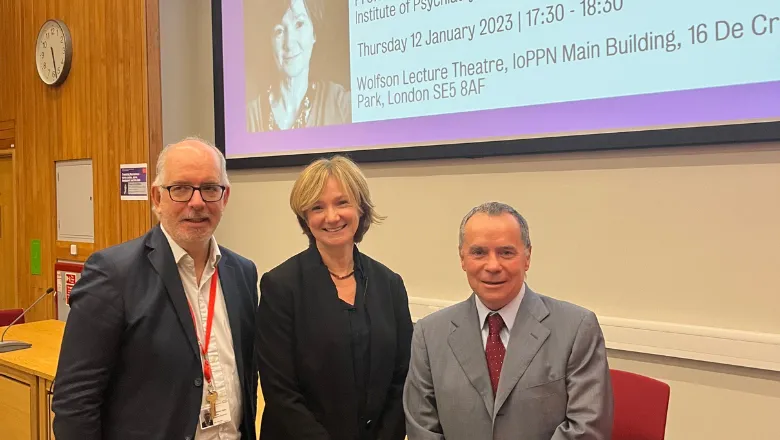There is not one single thing that you can do by yourself, it is all about teamwork. I want to tell the audience that my progress has been dependent on working with great students, post-docs, colleagues, academics, clinicians and, most importantly, people with lived experience of neurodevelopmental conditions and their families.
Gráinne McAlonan, Professor of Translational Neuroscience, Department of Forensic and Neurodevelopmental Sciences, IoPPN
18 January 2023
Professor Gráinne McAlonan delivers IoPPN Inaugural Lecture 'Translating Neuroscience - across species, across development and into clinic'
The second inaugural lecture of the 2022/23 IoPPN Inaugural Lecture Series, entitled 'Translating Neuroscience - across species, across development and into clinic' was delivered by Professor Gráinne McAlonan on Thursday 12 January 2023.

Gráinne McAlonan is Professor of Translational Neuroscience based in the Department of Forensic and Neurodevelopmental Sciences (FANS), Institute of Psychiatry, Psychology & Neuroscience (IoPPN), King’s College London and leads the National Institute for Health Research (NIHR) Maudsley Biomedical Research Research (BRC) Theme for Child Mental Health and Neurodevelopmental Disorders.
Professor Allan Young, Head of School of Academic Psychiatry, IoPPN, opened the lecture with a welcome speech showcasing Professor McAlonan’s career highlights.
Following her Medical Sciences degree at the University of Cambridge, she completed her PhD with Professor Barry J. Everitt Emeritus Professor of Behavioural Neuroscience. She went on to complete clinical medicine training at the University of London (now Imperial) before coming to the Maudsley Hospital and the (then) Institute of Psychiatry. She spent over 11 years in the University of Hong Kong , challenging old theories and moving the field forward by looking into brain structure and function in neurodevelopmental conditions including autism, schizophrenia and ADHD. She returned to King’s at the end of 2011 and has studied the development of babies, from in utero imaging to infants, demonstrating that if foundational brain systems are altered, such as those which regulate sensory processing, then there can be knock on effects on more complex systems. Her recent work has also focused on sensory function, as it is important to the autistic people she works with. It shows the over-engagement of sensory systems in response to a repeated tone, rather than tuning it out, as a non-autistic individual may do.
In the closing vote of thanks, Professor Declan Murphy, Professor of Translational Neurodevelopment and Head of Department for the Department of Forensic and Neurodevelopmental Sciences (FANS) at IoPPN, said
You are an exemplar of bringing work from the bench to the bedside, a world-class leader and the most fabulous colleague and supervisor - we all thank you from the bottom of our hearts
Professor Declan Murphy, Professor of Translational Neurodevelopment and Head of Department for the Department of Forensic and Neurodevelopmental Sciences (FANS), IoPPN
Professor McAlonan is a group leader within the Department of Forensic and Neurodevelopmental Sciences at IoPPN and is a lead investigator within the EU-AIMS-2-TRIALS consortium – a European network hosting the world’s largest grant for autism research. She is responsible for fetal/neonatal/infant brain imaging studies of children vulnerable to neurodevelopmental conditions and for pharmacology studies in adults with ASD. Her current research is informed by her work in the National ADHD and Autism Service for Adults at the South London and Maudsley NHS Foundation Trust (SLaM) and she is the Lead for the Child Mental Health and Neurodevelopmental Disorders Theme in the NIHR Maudsley BRC. She uses MRI as a translational tool to link brain and behaviour in people with neurodevelopmental conditions such as Autism Spectrum Conditions; and to ‘back’ (and ‘forward’) translate to laboratory models.

